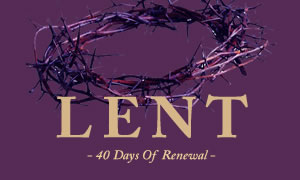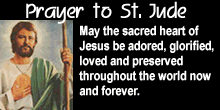


 I remember a day when I woke up and decided I was going to be holy. Sounds good, doesn’t it? The problem was, I didn’t think I could be holy enough as myself. So I looked at the people around me who I felt were holy and tried to be like them. Of course, it was a disaster. I couldn’t sustain the act of not being myself. Of course it’s good and wonderful to be inspired by other people and to allow ourselves to grow closer to God through them. But when we begin to lose who we are, we struggle to find God.
I remember a day when I woke up and decided I was going to be holy. Sounds good, doesn’t it? The problem was, I didn’t think I could be holy enough as myself. So I looked at the people around me who I felt were holy and tried to be like them. Of course, it was a disaster. I couldn’t sustain the act of not being myself. Of course it’s good and wonderful to be inspired by other people and to allow ourselves to grow closer to God through them. But when we begin to lose who we are, we struggle to find God.
We all may, at different times, have different misconceptions about holiness. Here are a few (though not exhaustible!) myths busted about holiness.
1. Holiness is Not an Absence of Feeling
Feelings can feel bad – hatred, laziness, lust. We know it’s not good to live entirely directed by our feelings, or to be under the control of them constantly. But the other way – to treat them entirely as a direct route to sin, is a sure step to living an internally fractured life. Becoming holy does not mean you should aim to feel nothing, or to feel numb. Feelings need to be acknowledged. If they are good, we can celebrate. If they are feelings that would lead us to sin, we should also acknowledge them, but investigate the root causes of them, not just recoil from them and bury them away. That way, we can grapple with them, engage with them, and with help and support, seek forgiveness and healing for the times we have acted on them. Fr Ron Rolheiser, OMI, explains this well when he writes:
“It’s easy to mistake depression for sanctity, sentimentality for piety, rigidity for orthodoxy, narrow sectarianism for loyalty, repressed sexuality for wholeness, and denial of one’s complexity for stability… I say this sympathetically. None of us are free from these struggles. But, with that being confessed, we shouldn’t be fooled by false sanctity. Depression, sentimentality, fearfulness, narrowness, rigidity, and repression drain the energy from a room. Real sanctity, piety, orthodoxy, loyalty, wholeness, and stability bring energy into a room and don’t make you swallow hard and feel guilty because your own blood is filled with a more robust energy. The presence of real sanctity sets you free and gives you permission to feel good about your humanity, no matter how red your blood. Real sanctity attracts and radiates life; it doesn’t unconsciously beg you to play the Good Samaritan to cheer it up.”
2. Holiness is Not Being Solemn and Serious all the Time
Holiness does not mean you stop having fun or enjoying the finer things in life. “I figured, if God was calling me to be a priest, he was calling me to be a priest,” says Fr John Muir in his excellent ‘Day in a Life of’ video, which shows him going for his morning run, rocking out to his favourite music in the car and laughing and joking with his friends. Our hobbies and interests only become a problem if they eclipse the friendship we have with God. Have hobbies, have interests, do things that add color and richness to your life. To widen the experiences and understanding of your life is to widen your understanding of God.
3. Holiness is Not Doing an Unreasonable Amount of Prayer or Fasting
Okay let me get this one straight! Of course, our whole lives can be an offering to God; we can pray our way through the day and be with God at any time. Fridays and Lent can be special times of fasting too. Fasting and living more somber times are important – they help us focus more closely on God, lose the distractions and rejoice more in the celebration when it comes. But holiness is not a competition in how much we can pray or fast. We need to live our daily lives and do the things – work, studying, looking after our family – that are required of us. As St Teresa of Avila said, ‘God is to be found among the pots and pans’- not just spending hours in the chapel. There is a beautiful line to be found in Psalm 127:2 which says, “It is in vain that you rise up early and go late to rest, eating the bread of anxious toil; for he gives to his beloved sleep.”
Yes, faith does require work and perseverance, but there is a sense also that we can relax. God has got it. He doesn’t require us to put hours of energy in in order for Him to grant us some unattainable level of holiness. He just requires us to be, and to let Him love us, and to find Him in us and us in Him.
4. Holiness is Not Judging Other People
The command to ‘judge not’ causes a lot of controversy. Is the Lord giving us carte blanche to allow the people around us to do whatever they like without being checked? Does it mean we can never speak out about wrongs, particularly when they are closely connected with the behavior and actions of another person? No. There must be times when we correct others, when we try to educate others, when we speak out against injustices or even stand up for ourselves in unfair situations. However, judging is the attitude of “I would never ever do that myself!”. How do we know that?! Given other circumstances, less support, a different upbringing, maybe we would! We never know how weak we are until we face temptation, which can come sometimes completely out of the blue. Temptation can surprise us by its complete disregard for how good we already feel we are. With this in mind, holiness is not a state where we can feel comfortably better than other people. Neither is it a place where we can hammer out our truths to other people without any compassion. We all carry pain and brokenness. We need to reach out to people from a place where we genuinely acknowledge our own sin and what the Lord has done for us.
5. Holiness is Not Trying to be Someone Else Whom You Admire
This is more complex than simply saying ‘be yourself’. What if you think of yourself as not holy enough?! Of course, it is necessary and great to have role models, people to look up to, people who can give us advice, but this becomes an issue when we go out of our way to bend and change our personality. If you’re a naturally gregarious and energetic person, don’t try and become constantly still and silent because you have seen someone else who is holy and is like that. If you’re the quieter one, don’t worry about feeling like you need to get all fiery and loud about your faith. God needs all types of personalities, and is not hindered by who we are, or by our struggles or the things we think aren’t good enough. After all, He created us that way. It’s been hard to find the attribution to this quote, (let me know in the comments below if you know who said it!) but it’s great all the same: “When you get to heaven God won’t ask you why you weren’t more like Mother Teresa, he’ll ask you why you weren’t more like you.”
6. Holiness is Not Being Motivated by Fear
Another unhealthy approach to holiness is to think ‘I must be good otherwise bad things will happen’. There is no life in this, no joy. Being motivated by fear may work, but it does not allow us our freedom. Being good should not be our single aim. Growing in our relationship with the One who is goodness itself, should be our aim, allowing us to grapple with God, wrestle with our doubts, and ask all our questions. When we are motivated to be good for God out of fear, then it colors all our interactions with everyone around us. It stifles love.
7. Holiness is not Easy
Of course, even with a good understanding of what holiness is and isn’t, it still isn’t easy! Nothing worth it was ever easy. It can’t be attained in a day. It is a life-long marathon, not a sprint. Holiness requires us to leave our comfort zone, to engage in a battle that we might keep losing for a very long time. Perhaps the hardest part of holiness is picking ourselves up again and again and again – and admitting that we can’t do it all on our own. After the Apostle Peter writes about resisting the devil and temptation, he writes: “And after you have suffered a little while, the God of all grace, who has called you to his eternal glory in Christ, will himself restore, confirm, strengthen, and establish you.”
So, “be patient with all things, but first of all with yourself.” (St Francis de Sales)
8. Holiness is not a Hiding Your Faults to Appear Perfect
Sometimes I can look at others and think, ‘they’re so holy! Would they be shocked if they knew everything about me?’ The truth is, there’s no hierarchy to holiness. Attempting to hide our faults probably takes more time, effort, and energy than just holding our hands up and saying we’re not perfect and are in need of God’s grace and other people’s support. This is why it is so important to cultivate a world where we are all aware that we are in need of God’s and each other’s forgiveness – because that leads to compassion, and in an atmosphere of compassion we can be real about ourselves and strive to find healing. Seriously. Support each other. Be gentle with one another’s weaknesses. If someone opens up and shows their wounds and scars and failings, don’t trample all over them. Be merciful as your Father in heaven is merciful.


I have been thinking a great deal about my experience at Reconciliation this past Saturday. I felt an intense and unexplainable urge to go and confess my sins when I woke up that morning. I try to go every six weeks or so, but this was no routine visit to the priest for me. I needed to unburden myself of the numerous venial sins I had committed since I last participated in this Sacrament.
Purest Gold: God's Refining Fire in our Lives »
After salvation, many young Christians wonder if there's anything more to their newfound faith than just the security blanket of "being a Christian." Time and time again, God shows himself as a "refiner," and our lives are as gold. God started leading me in this study to understand what He was doing in my life, as well as in the lives of others.
Picking up my pen to write this column, I couldn’t imagine how time flies. Since the last publication of this column I have gone through a lot, especially the loss of my dear mother to whom I dedicate this article. Not only her, but seems I lost a whole generation of my close family.
How to Achieve Business Excellence »
“Do you see a man who excels in his work? He will stand before Kings; He will not stand before unknown men.” Proverbs 22:29
Spiritual Development for our Youth »
Most of us youth in today's fast moving world are easily thrown off by difficulties and worries.
The theme of conversion is a thread that runs all through Lent, but conversion takes on different aspects throughout the phases of Lent. The first two and a half weeks focused on the interior turning of hearts; the liturgy urges the faithful to reflect and examine consciences thoroughly.
Saint Josephine Bakhita »
Feast Day: February 8
Patron Saint Of: Sudan
Saint Josephine Margaret Bakhita was born around 1869 in the village of Olgossa in the Darfur region of Sudan. She was a member of the Daju people and her uncle was a tribal chief. Due to her family lineage, she grew up happy and relatively prosperous, saying that as a child, she did not know suffering.
Catholics Must Fast More Intensely This Lent»
The Norbertine Canons of St. Michael's Abbey have created this digital Lenten retreat so that you can journey through this holy season alongside them. If you want to have one of your best Lenten seasons yet, join us in our Lenten Program "The Great Fast" - https://theabbotscircle.com/the-great-fast-join
When Your Faith Is Put to the Test - Bishop Barron's Sunday Sermon»
Friends, we come now to the Second Sunday of Lent, and we’re on both dangerous and very holy ground with the first reading from the twenty-second chapter of Genesis. The ancient Israelites referred to it as the “Akedah,” which means the “binding”: Abraham binds and is ready to sacrifice Isaac at God’s command.

Copyright © 2002-2024 THE BEACON INTERNATIONAL CATHOLIC MAGAZINE. All rights reserved.
another mc.rufus interactive web design